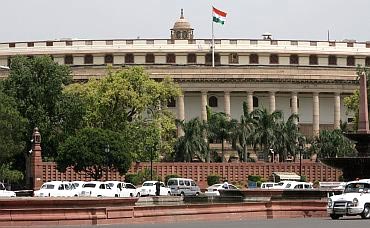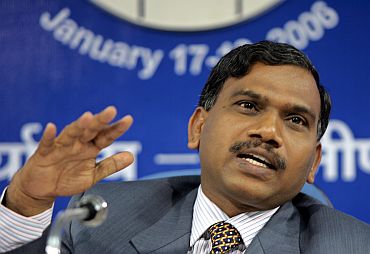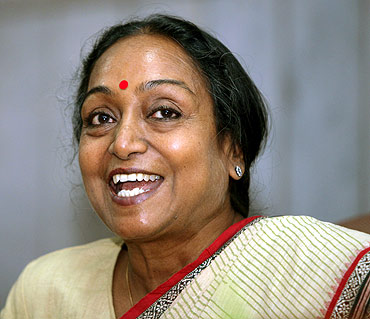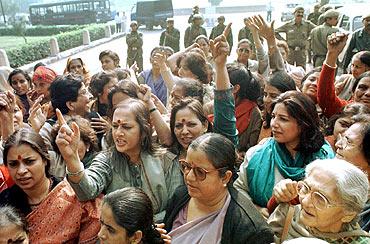It was a tumultuous year for Parliament, rocked as it was by disruptions over scams that led to the longest shutdown, of an entire session, for the first time in independent India.
Though disruptions of Parliament had become a routine affair in the last two decades, the just-concluded winter session of the House took the cake for its complete washout following the opposition-government standoff over the demand for the appointment of a joint parliamentary committee to go into the 2G spectrum allocation scam.
The standoff showed no signs of resolution as the year draws to a close, with the government maintaining its stand that the Public Accounts Committee was enough to do the job.
...
38-day shutdown cost the exchequer Rs 240 crore!
Image: On an average, the government spends Rs 6.35 crore per day to run ParliamentIronically, it was also the year in which members of Parliament got a bonanza, with their salaries and allowances being raised manifold.
The year gone by will have the dubious distinction of certain leaders holding a 'mock Parliament' in the Lok Sabha, causing widespread concern.
In fact, the demand for a JPC probe into the 2G spectrum allocations could spill to the New Year, with the Opposition threatening to stall the proceedings in the budget session too.
On an average, the government spends Rs 6.35 crore per day to run Parliament, according to official figures.
No proceedings in winter session for 22 days
Image: The winter session was washed out over the demand for a JPC in the 2G scam involving A RajaThough the shutdown in the winter session was total, the monsoon session saw the two Houses sitting late and working for extra days.
In fact, the total productive time of the Lok Sabha during the monsoon session was 94 per cent, while that of the Rajya Sabha 100 per cent.
In the budget session, the productive time of the Lok Sabha was 66 per cent of the scheduled time while in the Rajya Sabha, it was 74 per cent.
Speaker Meira Kumar continues her efforts to get Parliament working
As a concerned Speaker Meira Kumar will make yet another attempt on Thursday to bring Parliament back on rails, the war of words is continuing between the government and the Opposition over the standoff on the JPC issue.
In fact, no protests over the JPC formation on any issue have paralysed Parliament for 22 days as had happened this time.
The government is saying that extending the logjam to the budget session scheduled in February next would do "irreversible and immeasurable" damage to Parliament.
Highlight of Parliament in 2010: Women's Reservation Bill
A highlight of Parliament this year was the passage of the long awaited Women's Reservation Bill in the Rajya Sabha and the government is saying that it planned to bring it before the Lok Sabha soon. Another key bill passed was the Nuclear Liability bill.
The Lok Sabha and the Rajya Sabha have witnessed protests over the issue of price rise this year. It also saw debates on Commonwealth Games, judgment on the Bhopal gas tragedy as also situation in the Kashmir valley.
Incidentally, this year saw the Lok Sabha and the Rajya Sabha having new Leaders of Opposition, with the BJP's Sushma Swaraj assuming charge in the Lok Sabha and Arun Jaitley in the Rajya Sabha.






article